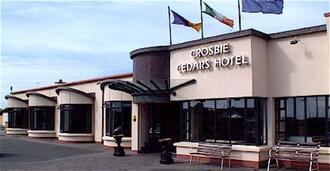- Featured
- Animal Rights
- Anti-racism
- Arts & Culture
- Children
- Climate
- Corporate accountability
- Crime
- Disability rights
- Economic
- Education
- Environment
- Food and Sustainable Production
- Gender Equality
- Governance and Transparency
- Health
- Housing
- LGBT Rights
- Mental health
- Northern Ireland
- Planning
- Privacy and Data Protection
- Rural Inequality
- Social Justice
- Trade
- Transport and Infrastructure
- Workers' Rights
- More
-
Justice for Fyffes Workers in Costa Rica and Honduras!Food workers and trade unions in the food export sector of Honduras and Costa Rica continue to be subjected to unsafe working conditions and not having their legal rights fulfilled. The estimated 25,000 people employed in the melon export sector in Honduras, of which 70% are women, regularly work 12-14 hour days, 7 days a week. The International Labour Rights Forum (2012) reports that 85% of workers earn less than the minimum wage [1]. Fyffes has been at the centre of several shocking scandals involving trade union violations and abuse of workers in Honduras and Costa Rica. A report by the US Department of Labor (2015) [2] detailed a litany of exploitative practices, ongoing labour code violations and ill-treatment of workers by the Fyffes subsidiary SurAgro in Honduras, including: That the company failed to pay the minimum wage, the 13th and 14th month bonuses, the seventh day bonus, and overtime; Failed to provide personal protective equipment and potable water; imposed a 300 HNL (US $14.40) penalty for missing a day of work (even with permission from a supervisor) in addition to that day’s salary; Threatened workers with dismissal for speaking with the Honduran Secretariat of Labor and Social Security (STSS) The general union in the United Kingdom, GMB, has called the actions of SurAgro one of the worst cases they have recorded, having documented “a shocking litany of abuse and exploitation on the part of Fyffes subsidiaries in Honduras” [3] and commented that “Fyffes... have no respect for domestic or international law governing workers’ rights and must be brought to book” [4]. In January 2016, workers at the Fyffes subsidiary became the first workers in the melon export sector to unionise and a local branch of the agriculture trade union STAS was formed. The following day, four trade union leaders were locked up in an office and threatened by the Chief of Security until they signed a document renouncing their union membership [5]. In an equally sinister occurrence, it was reported by the International Trade Union Confederation that on 13 April 2017, the trade unionist Moisés Sánchez (General Secretary of STAS’s sub-branch at Fyffes’ subsidiary in Honduras) was kidnapped, beaten and threatened with death if he continued his trade union work [6]. In May 2017 Fyffes was suspended from the Ethical Trading Initiative [ETI], an alliance of companies, trade unions and NGOs that promotes respect for workers' rights around the globe, finding that “the actions and approach taken by SurAgro [the Fyffes-owned Honduran melon plantation at the centre of the allegations] … contravene the open approach to legitimate trade union activities that ETI would expect within the supply chain to an ETI member” [7]. Despite the sale of Fyffes to the Japanese Sumitomo Corporation in early 2017, the Irish business news website Fora reported in June 2017 that David McCann and the “senior management team” based at the Fyffes head office in Dublin were handling the negotiations between the complainants, ETI and Fyffes [8]. Therefore, the Latin America Solidarity Centre is joining with other trade unions, NGOs and international Civil Society Organisations and demanding this actions from Fyffes.125 of 200 SignaturesCreated by Thais Mantovani
-
Legislate now to Ban Oil and Gas Drilling off Irish CoastPetition Update December 2020: In mid-December, we are going to deliver this petition and letters signed by both civil society groups from across the globe and members of the Houses of the Oireachtas urging Minister Eamon Ryan to support the granting of a money message from the Government so the Climate Emergency Bill can progress to committee stage as soon as possible. Petition Update September 2020: Not Here Not Anywhere has been campaigning to ban offshore drilling since 2017, and in that time we have seen progress and changes in government policy. In the 2020 Programme for Government agreed by Fianna Fail, Fine Gael, and Greens stated the following on oil and gas drilling "End the issue of new licenses for the exploration and extraction of gas, on the same basis as the recent decision concerning oil exploration and extraction" [1]. Now that Eamon Ryan is the Minister for Climate Action, he has the power to legislate and ban offshore oil and gas drilling outright. Recently, we submitted a Parliamentary question to find out when the legislation when going to be enacted. We got the below response from Minister Ryan "While there is no requirement for legislative underpinning, I and my Department will evaluate whether any further actions would be useful in terms of providing maximum clarity." [2]. We disagree with the Minister’s assessment, if the current government falls with no legislation passed it could lead to future licenses been issued under a new administration. Also, if legislation was passed it would be a major victory for the climate movement both in Ireland and globally and we would be joining other countries around the world which have shown this climate leadership [3]. We need to shed our climate laggard status, legislate to ban offshore oil and gas drilling, and KEEP IT IN THE GROUND. Original petition: On 11th July, just one week after onshore fracking was banned in Ireland, Minister of Communications, Climate Action and Environment, Denis Naughten, granted consent to oil & gas drilling by Providence Resources PLC in the Porcupine Basin off our south-west coast [4]. They expect to find 5 billion barrels of oil [5]. In an Orwellian twist, a “Department of Climate Action” has allowed for the burning of 5 billion barrels of oil when international climate experts state that 80% of the known fossil fuels have to stay in the ground if we want to avoid going over the safe 2 degrees limit of global warming [6]. Any investment in fossil fuel industry and infrastructure will result in what is known as “carbon lock-in”, taking us on a one-way unstoppable trip to dangerous levels of global warming that threaten global health and eco-systems [7]. Oil and gas exploration is also deadly for Ireland’s unique dolphin, whale and porpoise population [8] and plankton, the basis of the marine ecosystem [9]. Yet, Minister Naughten has refused to confirm if drilling will stop if a threat to the population is found [10]. We call on Minister Naughten to retract the Providence Resources permit immediately. Furthermore, we call on the Minister to follow the lead of France [11] and ban all new oil and gas exploration in Irish waters. We need to halt all dead investments in the fossil fuel industry and prepare a just transition to an economy that can provide workers with real, sustainable long-term jobs that can provide for their families and their future [12]. ------------------------------------------------------------------------------------------------------------------------------------ [1]https://www.greenparty.ie/wp-content/uploads/2020/06/2020-06-15-ProgrammeforGovernment_Corrected-Final-Version.pdf [2]https://www.oireachtas.ie/en/debates/question/2020-09-15/162/#pq_162 [3]https://www.looptt.com/content/new-zealand-next-list-ban-offshore-drilling [4] http://www.independent.ie/business/world/providence-resources-commences-drilling-off-the-southwest-coast-of-ireland-35921724.html [5] http://www.proactiveinvestors.co.uk/companies/amp/news/180745 [6] http://www.carbontracker.org/wp-content/uploads/2014/09/Unburnable-Carbon-Full-rev2-1.pdf [7]http://priceofoil.org/2016/09/22/the-skys-limit-report/ [8] http://news.nationalgeographic.com/news/energy/2014/02/140228-atlantic-seismic-whales-mammals/ [9] https://www.theverge.com/2017/6/23/15861932/offshore-drilling-airgun-seismic-surveys-zooplankton-death-oceans [10] https://www.kildarestreet.com/debates/?id=2017-02-07a.382 [11]http://www.independent.co.uk/news/world/europe/france-ban-new-oil-gas-exploration-stop-granting-licences-macron-hulot-renewable-energy-drive-a7806161.html [12] http://www.impact.ie/climate-change-workers-communities-must-protected-just-transition-carbon-free-economy-says-impact/7,361 of 8,000 SignaturesCreated by Not Here Not Anywhere - NHNA

-
Remove prescription charges for homeless peopleHomeless people suffer more ill health than the housed population and therefore have a higher need for prescription medication. Many homeless people cannot afford the €2.50 prescription charge payable on every item. Homeless health services repeatedly come across homeless patients who cannot afford their medication and so may not complete a course of antibiotics or take heparin for a clot. They often end up in hospital because of this. Homeless people are registered with local authorities and therefore it is possible to identify individuals so they are exempt from this charge.2,524 of 3,000 SignaturesCreated by Safetynet Primarycare
-
Investigate Intimidation of JournalistFreedom of speech is vital.7 of 100 SignaturesCreated by Eddie Byrne
-
Open the Cedars Hotel, Rosslare, as a refugee reception centreSyrian refugees are coming to Ireland in increasing numbers. There is a need for reception centres to provide accommodation and services to help refugees settle successfully in Ireland. https://www.thetimes.co.uk/edition/ireland/hotel-owner-blocks-plan-to-house-syrian-refugees-qbltd8c8n7 of 100 SignaturesCreated by Michael Cuthbert
-
Stop the Cúl Trá evictions!Galway City Council is planning to evict 10 families from Cúl Trá halting site in Lower Salthill, Galway leaving them homeless and with no alternative culturally appropriate accommodation.[1] This eviction would make over 42 people homeless including 22 children aged between 4 months and 10 years, some with medical conditions such as cystic fibrosis. The families were issued a notice to vacate by June 5th and Galway City Council has said it will consider court action if the ten families do not leave the site. Galway City Council has been well aware of overcrowding on Cúl Trá site for over a decade and yet no alternative halting site accommodation has been developed.[2] The Cúl Trá site was built 21 years ago to accommodate 6 families. No new halting site has been built in the city since. The 10 families that were served notices to vacate are the children of the 6 original families and have spent their whole lives living on the site. The families are part of the Salthill community with children attending local schools. One resident said that the children are the “heart and soul” of the community. If families are evicted they will be forced to leave their community and live on the side of the road without basic amenities. Kathleen Ward, one of the residents said; “The site is a fire and safety issue but isn’t it a fire and safety issue to put us out on the side of the road? We have nowhere to go”.[3] Galway City Council has proposed 3 pieces of land for temporary halting sites to address the Traveller accommodation crisis. Areas identified for the proposed sites are Ballymoneen Road, Headford Road and Westside. However, at a public council meeting, some local councillors have objected to these proposed halting sites. We are calling on Brendan McGrath to stop the Cúl Trá evictions and to use his executive powers to develop the proposed halting sites in Galway city. Notes 1. Galway City Council has a legal obligation to provide culturally appropriate accommodation under the Housing (Traveller Accommodation) Act 1998. 2. The need for additional halting sites to provide accommodation for the families at risk of eviction has been included in successive Traveller Accommodation Programmes however no new halting site has been built. 3. In 2016, in the wake of the Carrickmines tragedy, a fire safety audit of Traveller specific accommodation was conducted by The National Directorate for Fire and Emergency Management and a report was compiled with recommendations to address fire safety issues. This report recommended that measures to address fire safety should not be used to address overcrowding or other broader site management issues.202 of 300 SignaturesCreated by Galway Traveller Movement
-
Keep Equal Speaking Rights for all Parties in the DáilMicháel Martin is calling for the bigger parties on the Dáil to be given more speaking time than smaller parties. This is undemocratic and unfairly targets parties with less TD's, and those they represent.122 of 200 Signatures
-
Equal Rights for School SecretariesSecretaries employed under the DES 1978/79 scheme enjoy Civil Service salaries and terms of employment while secretaries employed after this time are paid through a grant given to individual schools where their salary, terms etc. are decided by the Board of Managements. In spite of all School Secretaries performing similar duties there is a vast discrepancy between pay and terms. Perhaps most importantly, secretaries paid directly by their schools have absolutely no pension to look forward to (even after 20 years plus loyal service) while those employed by the Dept. can look forward to a full Civil Service pension. The result of this arrangement is extremely unjust and we are asking to have it rectified with all School Secretaries being treated as Civil Servants and receiving remuneration and pension rights in line with their years of service.1,723 of 2,000 SignaturesCreated by Jackie O'Meara
-
Women Should Not Be Locked Up Because They Want An AbortionThe misuse of the mental health act as a means to deny women and young girls the medical care they need is not acceptable. It's time for real choice, it's time for a referendum on the eighth amendment that offers real choice to the Irish public.15,861 of 20,000 SignaturesCreated by Siobhan O'Donoghue
-
Protect & Expand NI Abortion RightsDUP MPs with extremist views on abortion must not be allowed to threaten an area of healthcare that one in three women will need in their lifetime. They must not be allowed to block the progress women deserve. It’s 50 years since the Abortion Act was passed and it needs to be extended not rowed back on32 of 100 Signatures
-
Please sign Irish petition for UN Committee Against TortureCommission to Inquire into Child Abuse Committee recommends that the State party: (a) Indicate how it proposes to implement all the recommendations of the Commission to Inquire into Child Abuse and indicate the time frame for doing so; (b) Institute prompt, independent and thorough investigations into all cases of abuse as found by the report and, if appropriate, prosecute and punish perpetrators; (c) Ensure that all victims of abuse obtain redress and have an enforceable right to compensation, including the means for as full rehabilitation as possible. Call to action : please show your support by commenting via change.org also uplift.ie and sharing this cause via social media Thank you to you and your supporters X p.s. no abusive language47 of 100 SignaturesCreated by Cli Buckley
-
Award the freedom of Dublin to Chelsea ManningOne day in 1948 Billy Fox, grandfather of U.S. Army whistleblower Chelsea Manning bid farewell to Rathmines Dublin and set off seeking work abroad. He settled in Haverfordwest, South Wales. On May 17th Billy’s granddaughter Chelsea Manning will be released from Fort Leavenworth high-security prison, having spent almost a quarter of her life in jail. Following former US President Barack Obama’s pardon, twenty-nine-year-old Chelsea will walk free having served seven years of the 35-year sentence imposed on her for telling the world the truth about US Army activities in Iraq, Afghanistan and elsewhere. Nothing would be more fitting than for Dublin City Council to celebrate truth and moral courage by granting the Freedom of the City to Chelsea Manning. Her Welsh/Irish mother Susan, as well as her aunts and uncles, have been to Dublin several times, and Dublin musicians, performers and supporters have been to South Wales to express solidarity with the relatives of a true hero. It is a golden opportunity to celebrate the diversity of Dublin’s global diaspora, and to honour a very special granddaughter of Dublin City in an age when the role of the whistleblower is more crucial than ever. .......... On Saturday May 20th members of the Manning family will participate in the 30th annual Afri famine walk in Doolough, Co. Mayo. On Sunday from 5.30pm-8.30pm they will be guests of honour at the Celebrating Resistance event at the Teacher’s Club in Dublin.258 of 300 SignaturesCreated by Dónal O'Kelly










.png)

